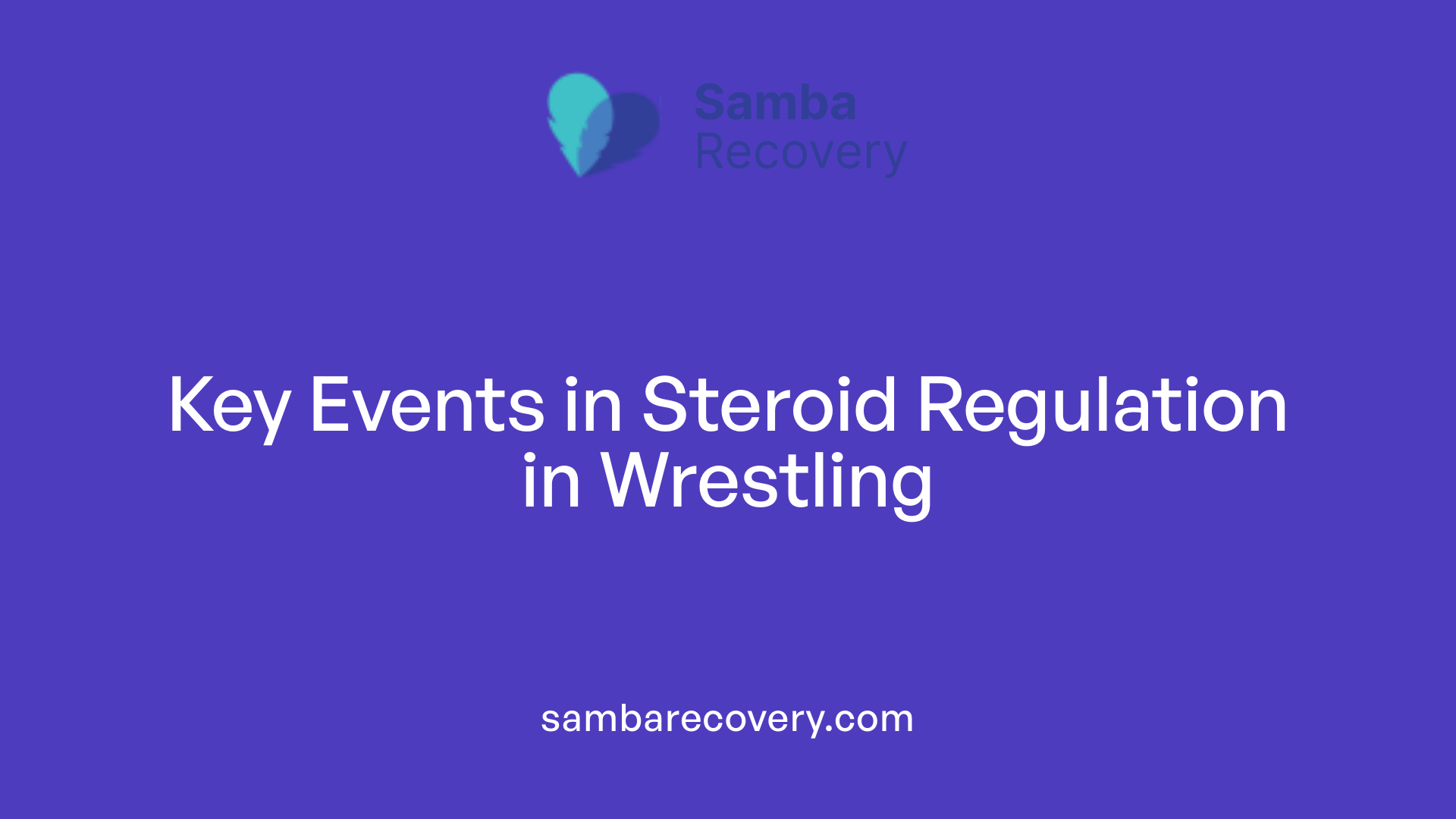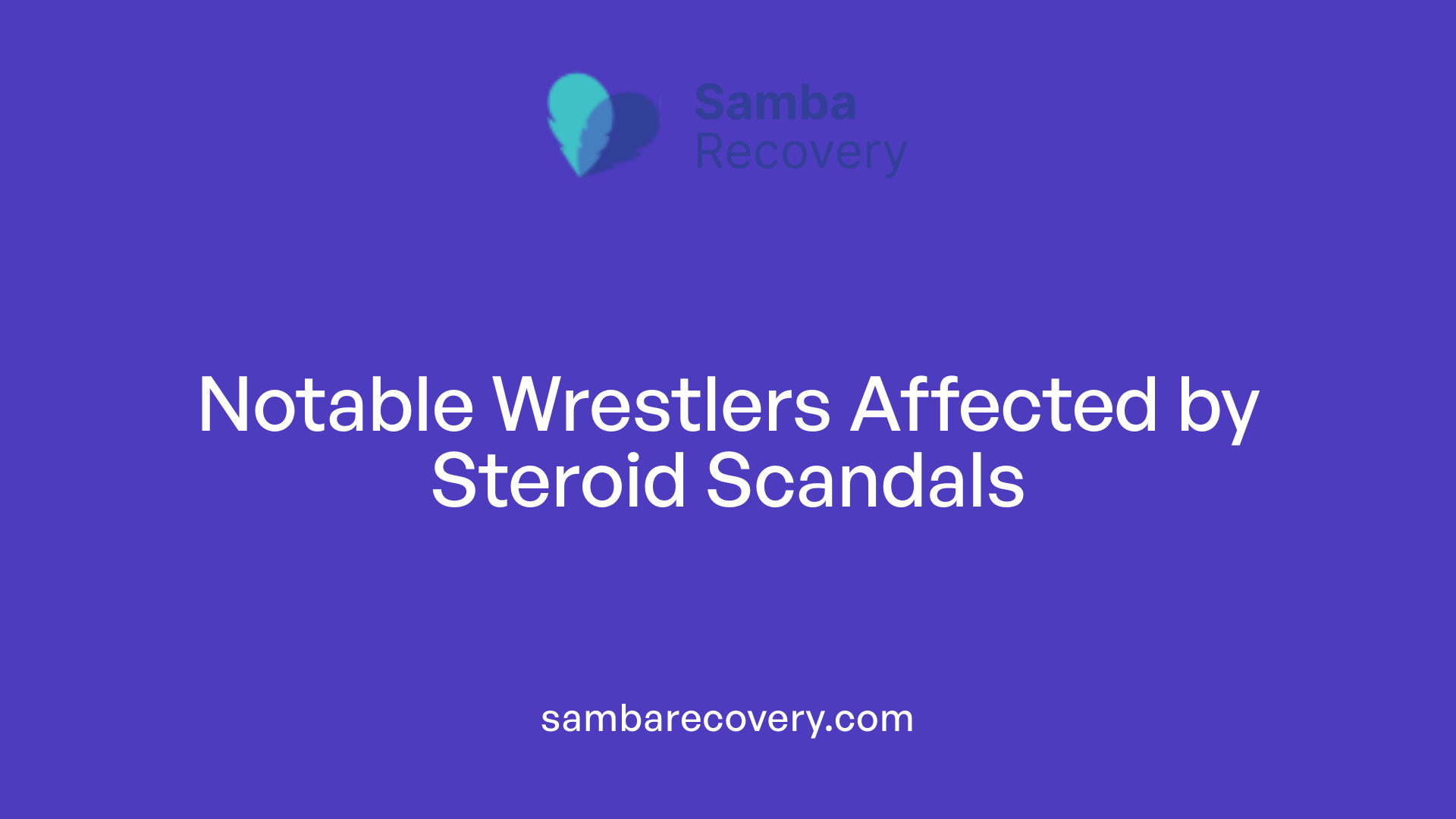An Event Overshadowed by Controversy
WrestleMania 29, held on April 7, 2013, at MetLife Stadium, promised to be a grand spectacle of athletic prowess and entertainment. However, beneath the surface, a darker narrative unraveled as controversies surrounding steroid use among its participants sparked wider discussions about the health and ethical standards in professional wrestling. This event, reflecting a persistent problem in the industry, highlighted substantial issues including health risks, regulatory measures, and the tarnished legacies of performers who fell victim to the allure of performance-enhancing drugs.
The Rise and Initial Policing of Steroids in Wrestling

When did steroids become illegal in wrestling?
Steroids became illegal in wrestling in 1991 under the Controlled Substances Act. This pivotal change led to significant reactions within the wrestling industry. Vince McMahon, chairman of the then-World Wrestling Federation (WWF), made a public commitment to a drug-free environment. He introduced a rigorous independent drug-testing policy aimed at tackling the rampant steroid abuse that had permeated the industry.
The wrestling world faced a further reckoning when McMahon was indicted in 1993 on federal charges related to steroid distribution. His ensuing trial in 1994 was a landmark moment, drawing considerable media attention. Ultimately, the jury acquitted McMahon of all charges, including conspiracy to distribute steroids and possession with intent to distribute. However, this incident solidified the scrutiny surrounding steroid use in professional wrestling, demonstrating both the pervasiveness of the issue and the legal consequences that could ensue.
As the wrestling community grappled with the implications of this scandal, the industry began to implement stricter regulations around drug testing. From 1992 to 1996, WWF enforced stricter policies in light of increased arrests and controversies, laying the foundation for modern drug testing practices within the organization. This era marked the beginning of an ongoing effort to foster accountability and enhance wrestler health while combating the ingrained culture of steroid use.
The Influence of the 1990s Steroid Trials

Impact of the steroid trials on wrestling
The early 1990s marked a pivotal period for professional wrestling as it became embroiled in controversy surrounding steroid use. The high-profile steroid trial of Vince McMahon and Titan Sports, which ensued after the arrest of wrestlers for drug-related charges, brought to light the rampant substance abuse within the industry. This trial revealed that many wrestlers failed drug tests, highlighting a culture of steroid misuse that harmed both the performers and the integrity of the sport.
As a result, the impact was profound, leading to a significant shift in how wrestling organizations approached athlete welfare. The publicity around the trials generated immense scrutiny, pushing industry leaders to take a stand against drug abuse and initiate policy reforms.
Policy changes after the trials
In response to the steroid trials and the associated scandals, including the tragic Chris Benoit incident, the WWE enforced stricter drug testing policies between 1992 and 1996. These policies not only tightened the regulations around substance use but also emphasized the importance of regular health screenings for wrestlers.
As a long-term measure, WWE launched the Talent Wellness Program in 2006, aiming to create a safer environment for athletes. By implementing random testing and health checks, the organization has sought to mitigate the risks tied to steroid abuse. Despite ongoing challenges, including over 30 suspensions for positive tests, these reforms reflect a significant cultural shift dedicated to wrestler safety and accountability.
| Year | Event | Impact |
|---|---|---|
| 1987 | WWF introduces drug testing | Response to arrests of wrestlers |
| 1991 | Vince McMahon steroid trial | Revealed widespread steroid use |
| 2006 | Talent Wellness Program implemented | Random drug tests and health screenings |
| 2013 | WrestleMania 29 steroid controversy | Heightened scrutiny and need for reform |
Events Leading to WrestleMania 29’s Controversy
Steroid Allegations at WrestleMania 29
WrestleMania 29, held on April 7, 2013, is often remembered not just for the high-profile matches, such as John Cena defeating The Rock, but also for the serious allegations of steroid use among its participants. At least three wrestlers from the card tested positive for steroids, casting a shadow over one of professional wrestling’s biggest spectacles. This incident served as a grim reminder of the ongoing issue of substance abuse in the wrestling community, echoing earlier scandals and reinforcing the need for enhanced health standards.
The fallout from these allegations stressed the importance of accountability within WWE and the wider wrestling industry. The scrutiny intensified following the event, amplifying discussions about the health risks associated with steroid misuse, which can lead to severe conditions like heart disease and neurological problems.
Instances of Failed Drug Tests
The path to WrestleMania 29’s controversy can be traced back to multiple steroid scandals that plagued WWE in the years preceding the event. Of particular note was the steroid trial involving Vince McMahon and Titan Sports in the early 1990s, where numerous drug tests returned positive results, ultimately leading to the implementation of stricter drug testing policies. Following the establishment of WWE’s Talent Wellness Program in 2006, over 30 wrestlers have faced suspensions for failing drug tests, further emphasizing the ongoing challenges with substance abuse.
These instances illustrate a recurring pattern of drug-related issues within the industry. The legacy of the Chris Benoit tragedy in 2007 and the admissions of past steroid use by well-known wrestlers highlight the pervasive culture that has persisted in wrestling. As a direct consequence of these failures, the wrestling community faces ongoing scrutiny, urging organizations like WWE to adapt and enforce stricter regulations to safeguard the health of their talent and the integrity of the sport.
WWE’s Talent Wellness Program: An Initiative Under Scrutiny

Implementation and Goals of the Talent Wellness Program
WWE’s Talent Wellness Program was established in 2006, primarily as a response to serious health incidents in the wrestling world, including the tragic death of wrestler Eddie Guerrero. The program aims to prioritize the health and safety of its performers by conducting regular drug testing and health screenings. It was a significant move toward combatting drug abuse, particularly anabolic steroids, which have long been a concern in professional wrestling.
Drug testing in WWE isn’t a new concept; it dates back to 1987 when the organization faced reputational damage from drug-related arrests among its wrestlers. Following that initial testing, heightened scrutiny began during the 1990s after a steroid trial linked several wrestlers to failed drug tests. The Talent Wellness Program reflects WWE’s commitment to ensuring that their athletes are not only performing at their best but also maintaining their overall health.
Challenges Faced by the Program
Despite the program’s noble intentions, it faces ongoing challenges. Since its inception, over 30 wrestlers have been suspended for violations related to positive drug tests, highlighting the persistence of substance abuse issues across the roster. WrestleMania 29, held in 2013, underlined the program’s weaknesses when at least three participants tested positive for steroids, raising questions about the effectiveness of WWE’s testing protocols.
The scrutiny around drug use continues as notable figures, including Roman Reigns and Edge, have faced suspensions for violating the wellness policy. The program’s ability to keep wrestlers accountable is crucial as it ties into broader health issues. Reports have indicated that more than half of the 65 wrestlers under 50 who died over the last decade had links to steroid use, emphasizing the critical need for ongoing vigilance and reform in testing practices to truly protect the health and safety of WWE athletes.
Notorious Cases and Suspensions Linked to Steroid Use

Prominent Wrestlers Involved in Steroid Scandals
Steroid abuse in professional wrestling has embroiled several notable figures over the years. For instance, Roman Reigns, a top WWE star, was suspended in 2016 after violating the WWE Wellness Policy. His case highlighted the ever-present issue of performance-enhancing substances within the industry. Similarly, Edge faced a 30-day suspension related to the 2007 steroid scandal but managed to rebuild his career shortly after.
Mr. Kennedy also opened up about his past steroid use, citing the WWE Wellness Policy as a turning point in his decision to stop using these substances. Moreover, Randy Orton came under scrutiny for receiving performance enhancers from 2004 to 2007, raising questions about the management’s response to drug abuse.
Consequences Faced by These Wrestlers
The repercussions for these wrestlers have been significant. Loss of reputation and job security often accompanies suspensions. Umaga, for instance, faced multiple suspensions due to substance abuse, ultimately leading to his release from WWE. The Ultimate Warrior, infamous for his steroid use, was released in 1992 and later passed away at age 54 due to health issues likely exacerbated by his long history of steroid abuse.
The wrestling industry’s crackdown on substance abuse through rigorous testing, such as WWE’s Talent Wellness Program initiated in 2006, aims to protect the health and safety of performers. Despite these efforts, the legacy of steroid use persists, reminding industry stakeholders of the critical need for ongoing vigilance.
The Long-Term Health Risks of Steroid Abuse

Physical and Mental Health Risks Associated with Steroids
Steroid abuse in professional wrestling poses serious health risks, affecting both physical and mental wellbeing. Known risks include:
- Cardiovascular Issues: Long-term steroid use can lead to hypertension, heart disease, and even heart failure.
- Neurological Problems: Users may experience psychiatric effects, including aggression, mood swings, and potential dependency issues, as steroids affect brain chemistry.
- Liver Damage: Oral steroids can cause liver failure and other severe liver conditions.
- Premature Aging: Steroid abuse accelerates bodily wear and tear, categorizing users at increased risk for chronic diseases and premature death.
Statistics on Wrestler Deaths Linked to Steroid Use
The severity of these health risks is underscored by alarming statistics. In recent years, it has been reported that over 65 professional wrestlers under the age of 50 have died, with more than half of these deaths linked to steroid use.
This indicates a concerning correlation that highlights the urgent need for reform in substance regulation within the wrestling industry.
Moreover, incidents like the 2007 Chris Benoit tragedy shed light on the tragic consequences of steroid abuse, as anabolic steroids were found in his system at the time of his death, emphasizing the devastating long-term effects associated with these substances.
In conclusion, the health implications of steroid abuse are dire, necessitating continued scrutiny and reform within professional wrestling.
Benoit Tragedy and Its Impact on Wrestling Policy
Details of the Chris Benoit Tragedy
The tragic events surrounding Chris Benoit in June 2007 shook the wrestling world to its core. Benoit, a highly respected professional wrestler, committed a murder-suicide that claimed the lives of his wife and son before taking his own life. Following this incident, authorities discovered anabolic steroids in Benoit’s home. This grim revelation raised significant concerns about the role of substance abuse in professional wrestling and its potential connection to unprecedented acts of violence and mental health deterioration.
Policy Changes in WWE Post-Benoit
In direct response to the Benoit tragedy and the scrutiny that the industry faced, the WWE implemented stricter regulations surrounding drug testing and wrestler health. The introduction of the Talent Wellness Program in 2006 had already begun addressing health and safety, but the fallout from Benoit’s actions necessitated an even stronger commitment to combat substance abuse, including steroids.
From the establishment of the program, the WWE initiated random drug testing and regular health evaluations. Over 30 wrestlers have faced suspensions for violating these policies, reflecting a robust effort towards maintaining wrestler accountability and enhancing health standards across the industry.
The Benoit incident remains a cautionary tale within wrestling, emphasizing the critical need for reforms to improve the welfare of wrestlers and prevent future tragedies linked to substance abuse.
The Cultural Perception and Implications of Steroids in Wrestling
Fan perception of steroids
Fan perceptions of steroids in professional wrestling have been complex and often contradictory. Many viewers understand that the intense physicality and larger-than-life personas of wrestlers can be complemented by performance-enhancing substances. However, there is also widespread concern about the health risks associated with steroid use, particularly in light of tragic incidents like the Chris Benoit tragedy in 2007, where steroid abuse was implicated.
Fans want their heroes to be strong and entertaining, yet they also grapple with the ethical dilemmas posed by substance use. This duality reflects a broader debate about performance-enhancing drugs in sports.
Cultural impact and changed narratives
The impact of steroid controversies has significantly shaped narratives within the wrestling community. Post-WrestleMania 29, discussions surrounding health, safety, and integrity have pushed WWE to strengthen its Talent Wellness Program. This program aims to promote athlete health while addressing past wrongdoings.
In light of well-publicized scandals, wrestling organizations have shifted their narratives to focus on accountability. The stigma attached to wrestlers involved in steroid use has also changed, prompting the industry to develop educational programs about the dangers of steroids.
Summary Table of Cultural Perception and Implications
| Aspect | Details | Current Trends |
|---|---|---|
| Fan Perception | Mixed views; support for performance vs. health concerns | Increased awareness about health risks |
| Cultural Impact | Changes in narrative around health and integrity | Enhanced safety programs and educational efforts |
| Implications | Ethical discussions and regulatory reforms | Stricter drug policies and accountability measures |
These shifts in perception highlight the continuing evolution of professional wrestling’s relationship with steroids and their broader cultural implications.
Regulatory Measures Taken Against Steroid Abuse
Industry-wide efforts to combat steroid use
The issue of steroid abuse in professional wrestling prompted significant action from organizations like WWE. In the mid-1980s, after a series of drug-related arrests, Vince McMahon announced the first notable drug testing program in early 1987 to tackle cocaine use and other substances.
By the early 1990s, the landscape began to shift further following the steroid trial involving Vince McMahon and Titan Sports, which revealed multiple drug test failures among wrestlers. This led to stricter policies from 1992 to 1996.
In 2006, following Eddie Guerrero’s death, WWE implemented the Talent Wellness Program, designed not only to introduce regular drug testing and health screenings, but also to promote overall wellness among wrestlers. More than 30 wrestlers have since faced suspensions due to positive tests for PEDs and other substances.
Recent changes and their implications
Significant scandals, like the fallout from WrestleMania 29 and the 2007 Signature Pharmacy incident, further emphasized the need for reform. These events highlighted the prevalence of steroid use within the industry, making it apparent that more robust measures were necessary.
As a result, WWE has adopted random testing and educational initiatives addressing steroid misuse risks, reflecting a commitment to improving health and safety standards and ensuring accountability among its wrestlers.
The changes are critical, considering that over half of the 65 deaths of professional wrestlers under 50 in recent years are linked to steroid abuse, with long-term health risks including heart disease and neurological issues.
Wrestlers Who Overcame Steroid Scandals
Success Stories Post-Suspension
Many wrestlers have faced the ramifications of steroid scandals, but some have managed to turn their careers around after suspension. For instance, Edge, who was suspended for 30 days in 2007 due to his involvement in the steroid scandal, made a significant comeback, ultimately becoming a two-time WWE Hall of Famer. His ability to regain the trust of fans and management alike highlights resilience in the face of controversy.
Similarly, Roman Reigns faced a 30-day suspension in 2016 for violating the WWE Wellness Policy. Since then, he has transformed his image and cemented his status as a top star in WWE, demonstrating the potential for redemption after a setback.
Strategic Responses to Scandals
Following their respective scandals, many wrestlers chose to adopt a more transparent approach in their careers. For example, Mr. Kennedy openly discussed his past steroid use and credited WWE’s strict wellness policy for helping him quit. This willingness to confront their histories not only promotes accountability but also resonates positively with fans, who appreciate authenticity.
The wrestling industry itself has evolved to better address these issues. Initiatives such as educational programs on the risks of steroids and enhanced health screenings reflect an industry striving for a cleaner reputation. These steps are essential in fostering an environment where athletes can thrive without resorting to performance-enhancing drugs, ensuring better long-term health and career sustainability.
Summary of Overcoming Steroid Use
| Wrestler | Actions Taken After Suspension | Outcome |
|---|---|---|
| Edge | Returned to the ring with a renewed focus | Became a two-time Hall of Famer |
| Roman Reigns | Worked on his public image post-suspension | Became a top WWE main eventer |
| Mr. Kennedy | Openly discussed past steroid use, quit | Promotes accountability and health |
In conclusion, the journey of wrestlers overcoming steroid scandals demonstrates that with dedication, honesty, and support, setbacks can lead to significant comebacks in professional wrestling.
The Relationship Between Steroids and Wrestler Careers
Career Impacts of Steroid Allegations
The impact of steroid allegations on wrestlers’ careers is profound. Many wrestlers face severe repercussions, including loss of job opportunities, damaged reputations, and the risk of health issues. The negative stigma associated with steroid use can hinder a wrestler’s ability to secure future roles outside WWE, affecting their long-term career prospects. High-profile cases, such as that of Roman Reigns and Mr. Kennedy, show how suspensions can abruptly alter the course of a career. Reigns was suspended in 2016 for violating the WWE Wellness Policy, reflecting the scrutiny wrestlers face due to their past decisions.
Additionally, the tragic events surrounding Chris Benoit in 2007 highlighted the severe consequences of unchecked steroid use, further entrenching the perception that substance abuse can lead to devastating personal and professional fallout.
Industry Response to Steroid Misuse
In response to the ongoing steroid crisis, WWE has taken significant steps to mitigate misuse and enhance wrestler safety. Following alarming instances such as the steroid trial involving Vince McMahon in the early 1990s and the ongoing issues highlighted during WrestleMania 29, WWE introduced a stringent Talent Wellness Program in 2006.
This program encompasses random drug testing and mandatory health screenings, aiming to foster a culture of accountability among wrestlers. Despite these initiatives, several wrestlers, including Edge and Umaga, faced suspensions due to violations. Most recently, the events surrounding WrestleMania 29, where at least three wrestlers tested positive for steroids, underscore the persistent challenges the industry faces in maintaining drug-free sports.
Addressing Steroid Abuse and Its Impact on WrestleMania’s Legacy
WWE has a long history of addressing steroid abuse, particularly highlighted in the context of its marquee event, WrestleMania. The company implemented its first drug testing in 1987, initially targeting cocaine use, but after revelations from a high-profile steroid trial in the early 1990s, stricter protocols were established. In 2006, in response to health crises such as the death of Eddie Guerrero, WWE launched the Talent Wellness Program, which includes regular drug testing and health exams to enhance wrestler safety. Despite these measures, incidents like WrestleMania 29 in 2013, where at least three wrestlers tested positive for steroids, revealed ongoing challenges in enforcing drug policies. The history of steroid abuse in wrestling underscores the serious health risks involved, prompting continuous dialogue around the effectiveness of WWE’s efforts to ensure a safer environment for its performers.
Learning from the Past: Key Takeaways from WrestleMania 29
Lessons learned from health scandals
The controversies surrounding WrestleMania 29, particularly the steroid use among its participants, serve as sobering reminders of the challenges faced in professional wrestling. At least three wrestlers testing positive for steroids highlighted systematic issues surrounding substance abuse in the industry. This prompted a much-needed reflection on wrestler health and safety protocols.
Long-term impact on wrestling policies
In the aftermath of WrestleMania 29, there was a clear push for reform within WWE and beyond, aiming to improve drug testing measures and promote athlete accountability. The organization’s Talent Wellness Program, established in 2006, has been vital, resulting in over 30 suspensions due to positive drug tests. The risks associated with steroid use, including serious health complications, have spurred ongoing discussions regarding the importance of mental and physical well-being in wrestling.
Overview of Wrestling Substance Abuse Impact
| Issue | Description | Outcome |
|---|---|---|
| Wrestlers Testing Positive | Three wrestlers failed drug tests at WrestleMania 29, highlighting steroid abuse. | Calls for policy reform |
| Talent Wellness Program | Initiated in 2006, aimed at promoting wrestler health through testing. | Over 30 suspensions since inception |
| Health Risks | Long-term steroid use leads to neurological and cardiovascular issues. | Increased scrutiny on wrestler health |
The fallout from these incidents emphasizes the ongoing necessity for reform to address substance abuse and protect the welfare of wrestlers.
The Path Forward for WWE and WrestleMania
Future Approaches to Health and Safety in Wrestling
In light of past scandals and the ongoing challenges related to substance abuse, WWE is focusing on developing effective strategies aimed at prioritizing the health and safety of its performers. This involves refining the existing Talent Wellness Program, which not only includes rigorous drug testing but also emphasizes comprehensive health screenings and education on the risks associated with steroid use.
Innovations and Commitments to Drug-Free Wrestling
WWE’s commitment to cleaner sports is reflected in several initiatives:
- Enhanced Drug Testing: WWE has instituted random drug testing, which acts as a deterrent for potential violators. This initiative has seen over 30 wrestlers suspended since its inception in 2006.
- Educational Programs: Through workshops and seminars, WWE aims to educate its talent about the dangers of performance-enhancing drugs and promote healthier lifestyle choices.
- Supportive Environment: WWE is investing in mental health support and counseling services to address the psychological factors that may lead wrestlers to abuse substances.
Looking Ahead
As WWE continues to evolve, it is crucial for the organization to uphold its commitment to a drug-free environment, ensuring that their events, including major spectacles like WrestleMania, reflect the values of fairness and integrity. The spotlight on health and wellness not only enhances wrestler safety but also safeguards the reputation of professional wrestling as a whole. The organization is at a crossroads, and the adoption of these innovations will play a pivotal role in fostering a healthier future for all its athletes.
Moving Beyond the Shadows
As the legacy of WrestleMania 29 continues to provoke rigorous discussions, the importance of persistent vigilance and effective health policies becomes abundantly clear. The wrestling industry, scrutinized frequently for its history with steroids, must strive to reconcile its dynamic performances with the health and safety of its performers. By learning from past mistakes and committing to rigorous regulatory frameworks, the WWE and similar organizations can hope to shape a future where wrestlers thrive in an environment free from the pressures of drug abuse.
References
- WrestleMania 29 and the Legacy of Steroid Abuse – Arista Recovery
- Wrestlemania 29, a Legacy of Steroid Abuse
- Wrestlemania 29, A Legacy of Steroid Abuse – Prescott House
- Wrestlemania 29, A Legacy Of Steroid Abuse – Dove Recovery
- WrestleMania 29 and the Ongoing Steroid Abuse Controversy
- 5 WWE Superstars Fired for Steroid Use – Times of India
- The Ultimate Warrior – Wikipedia
- United States v. McMahon – Wikipedia
- Vince McMahon – Wikipedia
- United States v. Progressive, Inc. – Wikipedia






